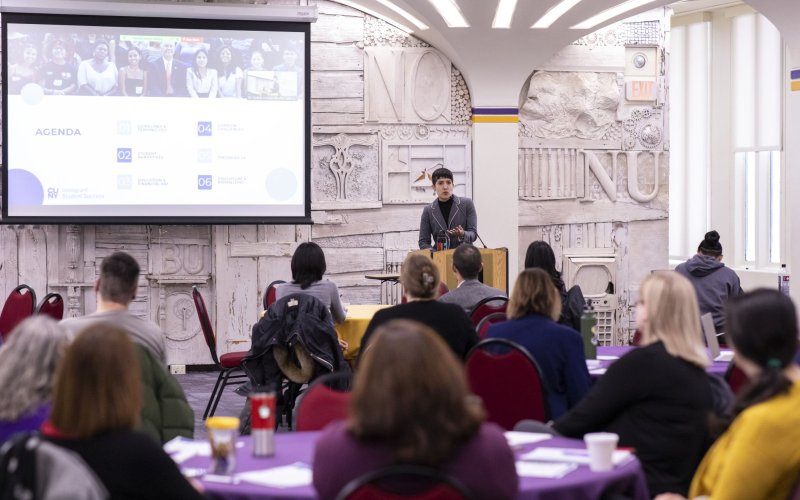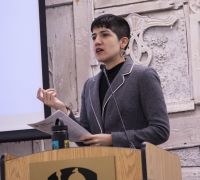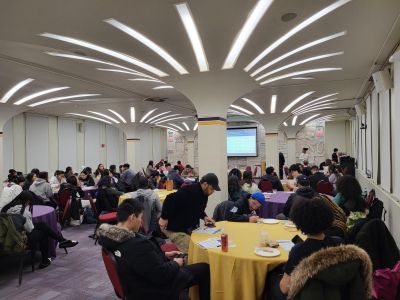'UndocuAlly' Trainings Share Tools for Supporting Students Regardless of Immigration Status

ALBANY, N.Y. (March 2, 2023) — Any student can attend a SUNY school, regardless of immigration or legal residency status. But that doesn’t make it easy for undocumented students to navigate paperwork, financial aid, housing or landing a part-time job.

At three training sessions in the Campus Center last week, Cynthia Carvajal, director of Undocumented and Immigrant Student Programs for City University of New York (CUNY), shared information on understanding and supporting these students as they learn to navigate and excel in a college or University setting.
The trainings were made possible in large part by a Diversity Transformation Award from the University’s Office of Diversity and Inclusion. The award proposal was submitted by Elizabeth Jach, a visiting assistant professor in the School of Education’s Department of Educational Policy and Leadership.
“When I saw the call for Diversity Transformation Award proposals, I thought UndocuAlly training could be a great opportunity,” Jach said. “I reached out to a couple of national colleagues and was referred to Dr. Carvajal, who agreed to come to UAlbany.”
Jach noted that the assistance and support from Luke Rumsey in Government and Community Relations and Dean of Students Clarence McNeill helped organize and spread the word about the trainings, resulting in high attendance from engaged audiences.
Carvajal provided three distinct trainings, aimed at students, faculty and staff, and University leadership. All included information on the breadth of experiences these students have – mixed status families, asylum seekers, refugees, DACA recipients, some on a pathway to permanent resident status and others fearful of deportation. Many “undocumented” students have a variety of documents, including employment-only social security cards, tax ID numbers, driver licenses, birth certificates and high school diplomas.
The meeting with University leadership focused on policies and procedures that impact students in various documentation and status situations, and on ways SUNY and individual institutions can work to support these students.
The session for faculty and student-facing staff included identifying ways to help students navigate both academic and non-academic aspects of college. This includes choosing majors, advisement, internships and work — and the particular fears and concerns that a student without permanent legal status might have.

The student session, filled to capacity, focused heavily on how to support student peers who don’t have permanent status.
Two collaborators accompanied Carvajal: a community organizer from the New York State Youth Leadership Council and a current undergraduate policy intern at Brooklyn College. The speakers presented to UAlbany audiences about available resources in the state of New York and their own experiences. In CUNY, both Brooklyn College and John Jay have Immigrant Student Success Centers, offering resources, community, and safe spaces for students with differing immigration statuses
“I applaud our leadership, faculty, staff and especially our students who came out to share space, and build capacity and knowledge about how we as a University can support our undocumented students in their journey to degree completion from UAlbany and beyond," McNeill said.
While SUNY does not take immigration or citizenship status into account when admitting students or require proof of citizenship or legal status, and will not share student immigration status with anyone without a court order, undocumented students still face barriers.
Carvajal pointed out that while the CUNY application does not ask students to reveal their citizenship status, the SUNY application does, which could discourage some students from applying to a SUNY school.
Some students without permanent status are mistakenly treated as international students, with higher tuition rates. In fact, all students are eligible for in-state tuition rates if they graduated from a high school in the state after attending for at least two years or took a GED prep class in the state and received a GED. In both cases students need to apply to a SUNY school within 5 years of getting that diploma or GED.
Students without permanent status have different financial aid needs, with most not eligible for federal aid. Most are eligible for opportunity grants and state aid but must apply through the New York State Dream Act. One way of being more inclusive, Carvajal said, would be for websites to make clear that students can apply for aid either through FAFSA or the Dream Act.
Because SUNY and its individual colleges and universities don’t track immigration status, the number of DACA, undocumented or mixed status students is unknown.
In addition to the Diversity Transformation Award, support for UndocuAlly training sessions came from University Auxiliary Services, the School of Education, the Division for Student Affairs, the Office of Government and Community Relations, the Department of Educational Policy and Leadership, Students in Education Administration for a Change, the NYC Chapter of the Scholar Strategy Network and members of the Sociology Department.
Those who want more information on how to support students without permanent resident status can watch a recording of the session for faculty and staff.




